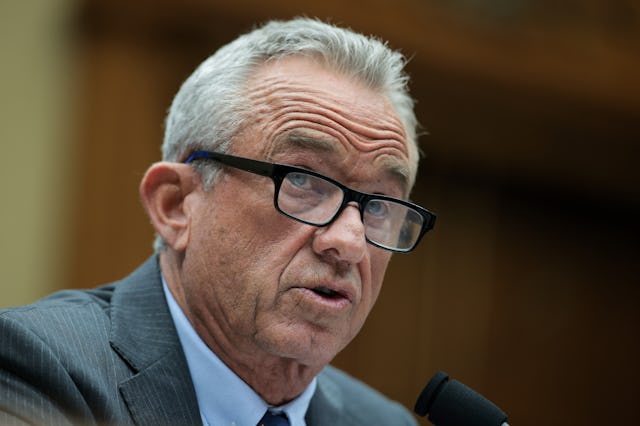RFK Says Wearable Devices Will Help Make America Healthy Again
The HHS secretary praised continuous glucose monitors in particular, declaring their effect on health “miraculous.”

In testimony to the House of Representatives Committee on Energy and Commerce's Subcommittee on Health this week, Health and Human Services (HHS) secretary Robert Kennedy shared his “vision:” that “every American is wearing a wearable within four years,” and that his department would launch “the biggest advertising campaign” in its history.
Kennedy is referring to wearable items like FitBits, Oura rings, heart monitors, or continuous glucose monitors (CGMs), which track insulin levels via a sensor worn under the skin. In a statement to Representative Troy Balderson (R, OH), the secretary praised wearable devices as a way for people to “take control of their own health ... they can take responsibility.” He went on to praise CGMs as “miraculous.”
However, while Ozempic and other GLP-1 medications have been shown to promote weight loss and control glucose levels in diabetics, there is no evidence that wearable glucose monitors are particularly effective in weight loss or management efforts. Neither is there evidence that CGMs help improve dietary choices. Kennedy also did not reference any education initiatives that would be launched by HHS to help Americans understand or contextualize what to do with the information they receive from their wearables.
Balderson asked Kennedy to assuage security concerns in regard to Americans being encouraged to wear such tracking devices. The secretary ultimately demurred, opting instead to continue to praise the possibilities of these tools.
“You know the Ozempic is costing $1,300 a month, if you can achieve the same thing with an $80 wearable, it's a lot better for the American people,” Kennedy replied.
According to reporting by NBC News, the aforementioned ad campaign will be called “Take Back Your Health.” The four-year initiative is expected to cost $20 million to promote “clean eating,” exercise, and “spiritual growth,” though documents obtained by NBC did not mention corresponding funding.
“Apparently, what millions of Americans struggling to afford groceries need is a cool health wearable,” quips nutritionist and TikTok creator Dr. Jessica Knurick in a video responding to the campaign. “This is and always has been MAHA’s response to health. Push responsibility, just tell people like ultra-processed foods are bad, and promote wellness solutions like wearable tech ... Meanwhile, nothing is being done to address the real reasons Americans rely so much on ultra-processed food.”
In her response video, Knurick argued that policy that alleviates poverty, food deserts, and better regulation of food companies would be more effective public health measures. And yet nutrition programs like SNAP and funding to provide fresh food to local schools and food banks have been cut by the Trump administration.
“If they cared about improving health,” Knurick observes. “They’d focus on the system that is set up for Americans to fail.”
It is unclear whether the move would encourage Medicaid, Medicare, or private insurers to cover the cost of CGMs and other wearables, but the campaign could potentially see an increased use of the products. Whether they improve public or individual health outcomes also remains to be seen.